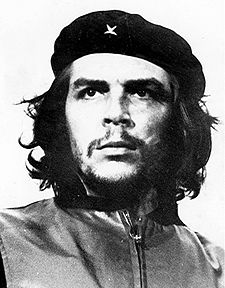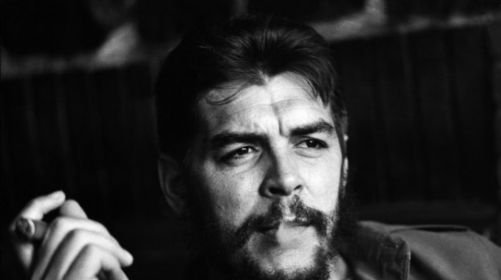Che Guevara
 Ernesto "Che" Guevara (Spanish pronunciation: [ˈtʃe ɣeˈβaɾa][4] June 14, 1928 – October 9, 1967)[1][5] was an Argentine Marxist revolutionary, physician, author, guerrilla leader, diplomat and military theorist. A major figure of the Cuban Revolution, his stylized visage has become a ubiquitous countercultural symbol of rebellion and global insignia in popular culture.[6]
Ernesto "Che" Guevara (Spanish pronunciation: [ˈtʃe ɣeˈβaɾa][4] June 14, 1928 – October 9, 1967)[1][5] was an Argentine Marxist revolutionary, physician, author, guerrilla leader, diplomat and military theorist. A major figure of the Cuban Revolution, his stylized visage has become a ubiquitous countercultural symbol of rebellion and global insignia in popular culture.[6]
As a young medical student, Guevara traveled throughout South America and was radicalized by the poverty, hunger and disease he witnessed.[7] His burgeoning desire to help overturn what he saw as the capitalist exploitation of Latin America by the United States prompted his involvement in Guatemala's social reforms under President Jacobo Árbenz, whose eventual CIA-assisted overthrow at the behest of the United Fruit Company solidified Guevara's political ideology.[7] Later in Mexico City, Guevara met Raúl and Fidel Castro, joined their 26th of July Movement and sailed to Cuba aboard the yacht Granma with the intention of overthrowing U.S.-backed Cuban dictator Fulgencio Batista.[8] Guevara soon rose to prominence among the insurgents, was promoted to second-in-command and played a pivotal role in the victorious two-year guerrilla campaign that deposed the Batista regime.[9]
Ernesto Guevara was born to Ernesto Guevara Lynch and Celia de la Serna y Llosa, on June 14, 1928,[1] in Rosario, Argentina, the eldest of five children in a middle-class Argentine family of Spanish (including Basque and Cantabrian) descent, as well as Irish by means of his ancestor Patrick Lynch.[19][20][21] In accordance with the flexibility allowed in Spanish naming customs, his legal name (Ernesto Guevara) will sometimes appear with "de la Serna" and/or "Lynch" accompanying it.[22] Referring to Che's "restless" nature, his father declared "the first thing to note is that in my son's veins flowed the blood of the Irish rebels".[23]
Very early on in life, Ernestito (as he was then called) developed an "affinity for the poor".[24] Growing up in a family with leftist leanings, Guevara was introduced to a wide spectrum of political perspectives even as a boy.[25] His father, a staunch supporter of Republicans from the Spanish Civil War, often hosted many veterans from the conflict in the Guevara home.[26]
Despite suffering crippling bouts of acute asthma that were to afflict him throughout his life, he excelled as an athlete, enjoying swimming, football, golf, and shooting, while also becoming an "untiring" cyclist.[27][28] He was an avid rugby union player,[29] and played at fly-half for Club Universitario de Buenos Aires.[30] His rugby playing earned him the nickname "Fuser"—a contraction of El Furibundo (raging) and his mother's surname, de la Serna—for his aggressive style of play.[31]